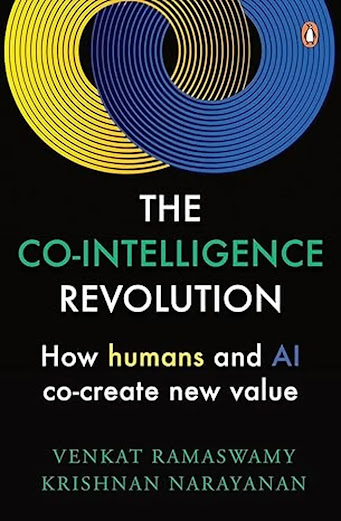It is an interesting playbook that draws from numerous real-world case studies to illustrate how co-intelligence demonstrates a paradigm shift in expanding the role and reach of traditional and emerging institutions. The book presents artificial intelligence not just a tool but as a vital partner in the process of co-creation. With over a hundred compelling examples from different ecosystems— from L’Oréal’s inclusive beauty platforms to digital expansion of public finance, citizen-services, and education—the book illustrates how co-intelligent enterprises will unlock their potential across private, public and plural sectors.
Overs last few years, L’Oreal, the 115-year-old global leader in the beauty business has moved from its earlier focus on ‘beauty for all’ to now stress on ‘beauty for each’. Highly personalized beauty routines are delivered through sophisticated cutting-edge technologies, providing skin and skin-care diagnostics to receive personalized recommendations. To achieve such results, the global leader has leveraged over ten large language models to apply neural network techniques that processes lots of data. As a result, L’Oreal is now speaking a new language that leverages tech-intensity to create new life-experiences through its co-intelligence platforms.
There are several cases where co-creation is pitched to increase efficiency and output. Venkat Ramaswamy and Krishnan Narayanan clearly explain evolving role of artificial intelligence in breaking down complex concepts in an accessible way. In the new realm of co-intelligence, organizations have to craft co-intelligence architectures powered by platforms for sharing digitalized infrastructure. It may be easy read for companies who wish to have AI drive future of their business. There are number of cases where industries are embracing AI as a collaborative partner. Even institutions like the University of Michigan are doing trailblazing work on promoting AI literacy and providing AI access. Its AI services attract an average of 15,000 users a day, and thousands are using these services. If its ten-year vision is anything to go by, the university aim is to develop future-proof educational models.
The Co-Intelligence Revolution is a latest phase of the industrial revolution, it is the creative synergy between human intelligence and machine intelligence, where AI augments and amplifies human capabilities. And this revolution is technologically driven by electronic neural networks fed with vast amounts of data and put to work with accelerated computing, in a form of AI factory. However, a crucial question is regarding the security and sustainability of AI systems. Unlike in the past, co-intelligence enterprises in the anthropocene must grapple with the reality that their actions may significantly influence the very systems on which they rely.
Venkat and Krishnan have written an insightful guide which suggests that value creation will lead to collaborative experiences co-created by companies and customers. They argue compellingly that AI must be embraced as a strategic partner rather than a mere tool, and that they present several cases where it is made possible. They have painstakingly put together a road map for a better future – one that AI serves humanity, not the other way around. For example, Jugal Bandi, which refers to a duet between musicians, is actually helping multiple language users access information about 20,000 government programs in native languages, regardless of the source language of the information. The rapid diffusion and democratization of AI capabilities is undoubtly remarkable but there is every reason to believe that much more needs to be done.
Despite initial success with several cases, the authors tend to agree that no single example could possibly exemplify the trend. By their own admission, the examples are being used as thinking props. Nevertheless, The Co-Intelligence Revolution remains a clarion call to action in co-creating a new world of possibilities.
by Venkat Ramaswamy & Krishnan Narayanan
Penguin Business, New Delhi.
Extent: 414, Price: Rs. 999.

No comments:
Post a Comment